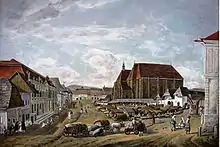St. Michael's Church, Cluj-Napoca
The St. Michael's Church (Romanian: Biserica Sfântul Mihail, Hungarian: Szent Mihály-templom) is a Gothic-style Roman Catholic church in Cluj-Napoca. It is the second largest church (after the Black Church of Brașov) in the geographical region of Transylvania, Romania. The nave is 50 meters long and 24 meters wide, the apse is 20×10 m. The tower with its height of 76 meter (80 meter including the cross) is the highest one in Transylvania. The western portal is decorated with the three coats of arms of Sigismund as King of Hungary, as King of Bohemia and as Holy Roman Emperor.
| St. Michael's Church | |
|---|---|
Biserica Sfântul Mihail (in Romanian) Szent Mihály-templom (in Hungarian) | |
 | |
| Religion | |
| Affiliation | Roman Catholic |
| Region | Transylvania |
| Patron | Michael |
| Status | Museum |
| Location | |
| Location | Union Square, Cluj-Napoca |
| Cercle | Roman Catholic Archdiocese of Alba Iulia |
| Geographic coordinates | 46.76996°N 23.58932°E |
| Architecture | |
| Style | Gothic, Baroque and Gothic Revival (tower)[1] |
| Groundbreaking | 1316[2] |
| Completed | 1487 |
| Specifications | |
| Width (nave) | 50 m[3] |
| Height (max) | 80 m (incl. 4-m high cross)[4] |
| Materials | Stone |

The construction was begun probably in place of the Saint James Chapel. The financing of the church was partly done by the citizens, partly from the income of indulgences. (The first related document from 1349, signed by the archbishop of Avignon and fifteen other bishops grants the indulgence for those contributing to the illumination and furniture of the Saint Michael Church.) The construction was completed between 1442-1447, the old tower was built between 1511-1545. The tower that stands today was erected in 1862.
The church was converted with the population to Protestantism between 1545-1566. Then the more radical Unitarian party took it over in the period 1566-1716. At last, it was confiscated in the counter reformation by the Habsburg government supported Catholic Church.
The oldest of its sections is the altar, inaugurated in 1390, while the newest part is the clock tower, which was built in Gothic Revival style (1837-1862).
Some important historical events that took place in the church:
- 26 July 1551: Queen Isabella of Hungary gives the Hungarian Crown to General Castaldo, the deputy of Ferdinand I., and cedes with that Hungary and Transylvania
- 23 October 1556: Queen Isabella returns and takes back the reign of Transylvania, in the name of her son, the child John II Sigismund Zápolya
- 27 March 1601: the third investiture of Sigismund Báthory as Prince of Transylvania
- 12 February 1607: election of Sigismund Rákóczi as Prince of Transylvania
- 7 March 1608: election of Gabriel Báthory as Prince of Transylvania
- 13 October 1613: election of Gabriel Bethlen as Prince of Transylvania
- 18 May 1944: the speech of Áron Márton, bishop of the Roman Catholic Church in Transylvania in which he strongly condemned the deportation of Jews.
Gallery
 The entrance
The entrance The three coats of arms of Sigismund I. on the western portal
The three coats of arms of Sigismund I. on the western portal The interior
The interior The remains of the frescoes
The remains of the frescoes The vaulting system
The vaulting system
References
- "10 lucruri pe care nu le ştiai despre Biserica "Sf. Mihail" din Cluj-Napoca". Buna Dimineata. 2 June 2015.
- "Biserica Romano-Catolica Sf.Mihail - Cluj-Napoca". Ghid Video Turistic.
- "Cluj-Napoca, Biserica Sf. Mihail". Welcome to Romania.
- József Lukács, Levente Várdai (2005). Povestea "oraşului-comoară": scurtă istorie a Clujului şi a monumentelor sale. Biblioteca Apostrof. ISBN 9739279740.
Further reading
- (in Hungarian) Fodor András: Kolozsvári képeskönyv, Gloria Kiadó – Erdélyi Híradó, Kolozsvár, 2002. ISBN 973-8267-10-2
- (in Hungarian) Gaal György: Kalauz a régi és az új Kolozsvárhoz, Korunk, Kolozsvár, 1992
- (in Hungarian) Mátyás Vilmos: Utazások Erdélyben, Panoráma mini útikönyvek, ISBN 963-243-065-4
- (in Hungarian) Sas Péter: A kolozsvári Szent Mihály templom, Gloria Kiadó, Kolozsvár, 1998, ISBN 973-9203-34-5
| Wikimedia Commons has media related to St. Michael's Church in Cluj-Napoca. |
External links
(in Hungarian) Official page on the website of the diocese of Alba Iulia